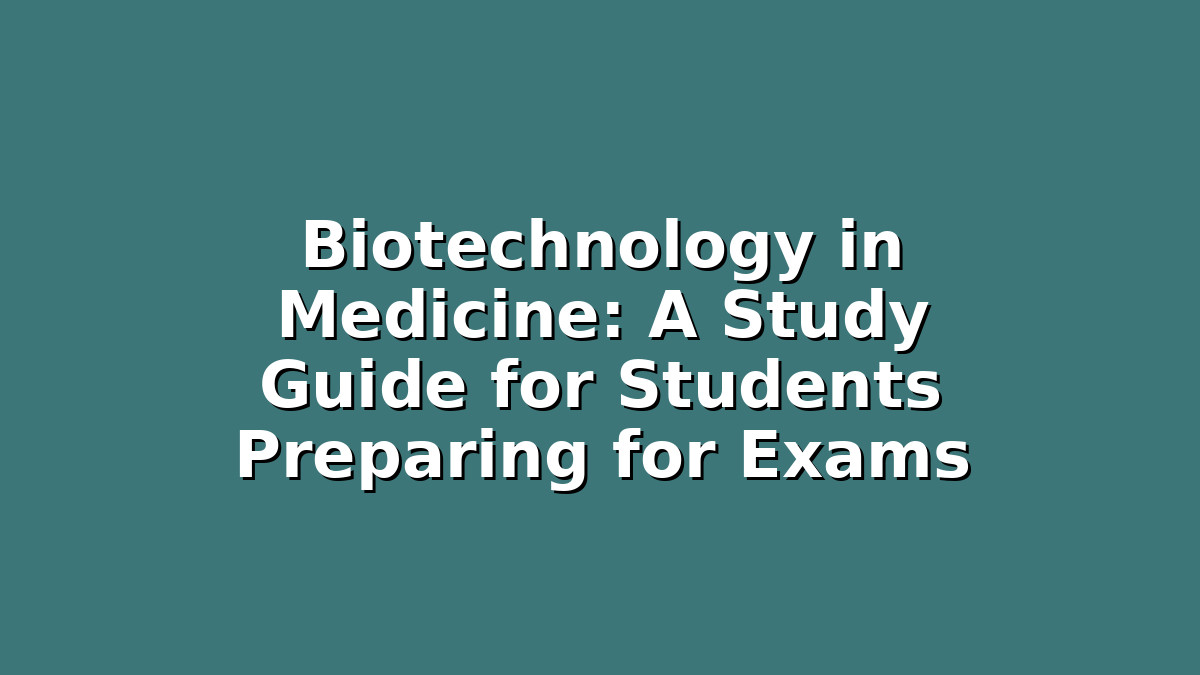Biotechnology is a fascinating and rapidly evolving field that combines biology and technology to develop innovative solutions in healthcare and medicine. For students preparing for exams, understanding the role of biotechnology in medicine is crucial, not only because it’s a common topic in biology and medical courses but also because it offers insights into real-world applications that can make studying more engaging and meaningful. This comprehensive guide will help you grasp key concepts of biotechnology in medicine while providing effective study tips to enhance your learning and exam performance.
Understanding Biotechnology in Medicine
Before diving into detailed study strategies, it’s essential to have a clear understanding of what biotechnology in medicine entails. Biotechnology refers to the use of living organisms, cells, and biological systems to develop products and technologies that improve healthcare. In medicine, biotechnology plays a pivotal role in developing new drugs, gene therapies, diagnostic tools, vaccines, and personalized treatments.
Key areas include genetic engineering, recombinant DNA technology, monoclonal antibodies, stem cell therapy, and biopharmaceuticals. Understanding these concepts and their medical applications will not only boost your knowledge but also prepare you to answer exam questions confidently.
Section 1: Mastering Core Concepts with Active Learning
One of the most effective ways to study biotechnology in medicine is through active learning techniques. Passive reading or memorization can be overwhelming, especially with complex topics like genetic modification or immunotherapy. Here’s how to make your study sessions more productive:
– Create Concept Maps: Visualize the relationship between different biotechnology techniques and their medical applications. For example, map out how recombinant DNA technology leads to the production of insulin or monoclonal antibodies help in cancer treatment. This will help you understand and remember connections rather than isolated facts.
– Use Flashcards for Terminology: Biotechnology involves many new terms—plasmids, vectors, CRISPR, PCR, etc. Use flashcards to drill definitions and functions. Digital tools like Anki or Quizlet allow you to practice regularly and track your progress.
– Summarize in Your Own Words: After reading a chapter or watching a video, write a brief summary in your own words. This reinforces comprehension and helps you internalize concepts.
– Teach Someone Else: Explaining complex ideas to a peer or even an imaginary audience can clarify your understanding and highlight any gaps in knowledge.
By engaging actively with the material, you’ll move beyond rote memorization, enabling deeper understanding and better recall during exams.
Section 2: Connecting Theory with Real-World Medical Applications
Biotechnology is not just theoretical—it has significant real-world impacts in medicine, which makes it more relatable and easier to remember. When studying, try to connect what you learn to actual medical breakthroughs or current events. This approach will also make your answers stand out in exams by showing applied knowledge.
– Research Recent Innovations: Look up recent biotech advances such as mRNA vaccines for COVID-19, gene editing therapies for rare diseases, or CAR-T cell therapy for cancer. Include these examples in your notes.
– Watch Documentaries and Interviews: Visual content like documentaries on the Human Genome Project or interviews with biotech researchers can deepen your understanding and inspire you.
– Practice Case Studies: Many exams include scenario-based questions. Practice analyzing case studies where biotechnology was used to diagnose or treat patients. This will improve your critical thinking and application skills.
– Relate to Ethical Considerations: Biotechnology raises ethical questions about gene editing, cloning, and stem cell use. Understanding these debates can enrich your essays and open-ended answers.
By linking theory to practice, you’ll not only retain information better but also develop a holistic view of biotechnology’s role in medicine, making your exam preparation more meaningful.
Section 3: Effective Study Tips and Exam Strategies
To excel in exams covering biotechnology in medicine, adopting the right study habits and exam techniques is essential. Here are some tailored tips to help you prepare confidently:
– Break Down Topics into Chunks: Biotechnology can be overwhelming if studied all at once. Divide the syllabus into smaller sections—such as genetic engineering, vaccine development, and diagnostic tools—and focus on one at a time.
– Practice Past Exam Questions: Familiarize yourself with the question format and commonly tested topics by solving past papers and sample questions. This will help you identify important themes and improve time management.
– Make Use of Diagrams: Diagrams like the process of gene cloning or immune response mechanisms are often tested. Practice drawing and labeling them neatly, as visual representation can earn you extra marks.
– Use Mnemonics and Acronyms: For sequences or lists (e.g., steps in PCR or types of biotechnological products), create mnemonics to aid memorization.
– Schedule Regular Revision: Instead of cramming, space your study sessions over weeks and revisit topics multiple times. Spaced repetition strengthens long-term memory.
– Stay Positive and Take Breaks: Studying challenging topics like biotechnology can be stressful. Maintain a positive mindset, reward yourself after study sessions, and include short breaks to avoid burnout.
By implementing these strategies, you will build confidence and improve your retention, enabling you to tackle biotechnology questions with ease during your exams.
Conclusion
Biotechnology in medicine is a dynamic and impactful field that offers exciting opportunities to improve health and save lives. For students preparing for exams, mastering this subject requires both understanding the scientific principles and appreciating their medical applications. By actively engaging with core concepts, connecting theory to real-world examples, and adopting effective study and exam strategies, you can enhance your learning experience and achieve excellent results.
Remember, studying biotechnology is not just about passing exams; it’s about gaining knowledge that could one day contribute to important medical advancements. Stay curious, keep practicing, and trust in your ability to succeed!

Responses